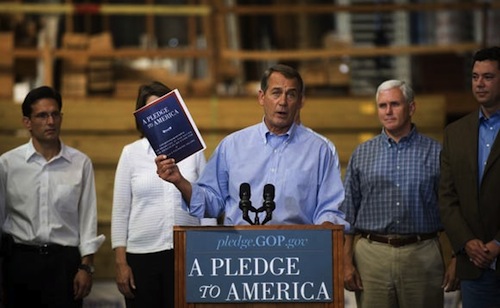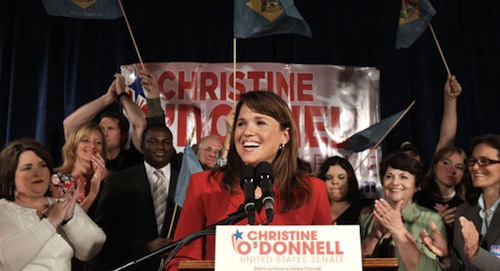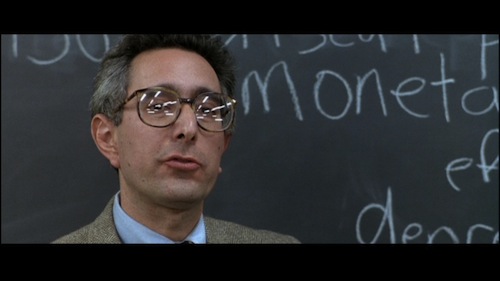Last week, the Republican Party released the full text of its Pledge to America, a document that explains the GOP’s plan for fixing what’s wrong with this country—most of which rhymes with “the hawk’s pajamas,” if you get their meaning. The content of the Pledge is not exactly a thunderbolt. It advocates the same policies that Republicans have been pushing for the last two to 74 years, as well as certain politically unlikely plans, such as eliminating the Environmental Protection Agency, that qualify less as a promise than a threat. The Republican Party’s pledge to America is that they will lower taxes and deregulate industry, plus repeal health care. While the notion of an America in which each session of Congress devotes itself to undoing the legislation passed by the previous session is exciting, most the Pledge itself is unremarkable. What is remarkable is its introduction—500 words of hyperbolic nationalism that are the subject of today’s Close Reading.
Tag Archives: GOP
What the Tea Party means: Christine O’Donnell
Partly because it’s the most vital movement in contemporary politics and partly because they’re hilarious, we’ve spent over a year now trying to figure out what the Tea Party means. While several of the philosophical questions—and even some of the ontological ones—remain unanswered, Tuesday made one practical outcome clear. Christine O’Donnell has defeated heavily-favored Delaware legislator Michael Castle in the Republican senate primary, thanks to the enthusiastic backing of the Tea Party. Where Castle polled favorably against likely Democratic opponents in the general, O’Donnell does not. It might be because she’s crazy. “A lot of people said we can’t win the general election; yes we can!” she told the Times. “It will be hard work, but we can win if those same people who fought against me work just as hard for me.” Two things: 1) Agreed that Christine O’Donnell will win the election if the people who don’t like her start liking her and 2) now she owes Barack Obama a nickel.
Something d-o-o economics. Voo-doo economics
John Smick sent me this excellent column by Martin Wolf on the political genius of supply-side economics. For those of you who did not hire me to help you prepare for the US History SAT II, supply-side economics is the theory that the best way to foster economic growth is by making it easier for people to produce (supply, natch) goods and services—primarily through reducing taxes on the rich and deregulating industry. Ostensibly, the increased economic activity generated by these policies offsets the decrease in revenue caused by the tax cuts; one gets 17% of $8 trillion rather than 34% of $4 trillion, and everybody wins. In practice, that’s never happened. Proponents will tell you that’s because supply-side economic policies have never been consistently implemented for a long period of time, but it might also be that the whole thing is hooey. Still, while the economic value of supply-side economics has yet to be demonstrated, its political value to the Republican Party is so significant as to have made it an article of faith.
She seems like a nice lady. Loves cats.
If Elena Kagan isn’t a lesbian, she’s about to have her feelings hurt. The Solicitor General and Supreme Court nominee is a former dean of Harvard Law School, served as an Associate White House Counsel under Clinton, and otherwise—as our disturbingly uniform national media points out—has a mighty thin paper trail. She’s never sat as a judge, so we can’t pore over her rulings to determine whether she’s going to require abortions in church or allow mean dogs wearing American flags to preside over secret terrorist trials or whatever. Her academic writings are well-regarded but also famously technical. And you can’t tell anything about her just by looking, either. Nope—not one thing. She’s like an empty vessel, or maybe a vase with a calla lily in it, or one of those orchids by Georgia O’Keefe. She has emerged freshly formed into the national spotlight from Obama’s side like Eve, or Lilith. Maybe more like Lilith Fair.
Frank Luntz ready to do for financial services reform what he did for health care
Show of hands, everybody: How many of you remember, from the 2008 election, the specifics of then-candidate Obama’s plan to adjust the federal tax code and gradually undo George Bush’s tax cuts? Okay, now how many of you remember Joe the Plumber? I’m willing to bet that if there wasn’t a massive discrepancy in responses to those two questions, it’s only because Combat! is read by the fourteen smartest people in America. The rest of us don’t like tax code. We like TV, and that’s because we don’t like politics—we like stories. Amidst the blurred tangle of vaguely recollected![]() plans that is* the push for health care reform, nothing is so memorable as the fictional Death Panel, the climactic scene in the story of a government bent on getting between you and your doctor. Don’t believe me? Nearly fifty percent of Americans do, because the difference between history and a story is that you remember a story. According to Eliot Spitzer—yes, that Eliot Spitzer—in Slate, the Republican Party is hard at work concocting another story about financial services reform, and they’ve gotten Frank Luntz to write it. Luntz was the primary author of last year’s Harry Potter and the Abortioner’s Throne, and he’s already released a teaser memo about how Republicans should talk about financial regulation. This sucker’s gonna be a sequel.
plans that is* the push for health care reform, nothing is so memorable as the fictional Death Panel, the climactic scene in the story of a government bent on getting between you and your doctor. Don’t believe me? Nearly fifty percent of Americans do, because the difference between history and a story is that you remember a story. According to Eliot Spitzer—yes, that Eliot Spitzer—in Slate, the Republican Party is hard at work concocting another story about financial services reform, and they’ve gotten Frank Luntz to write it. Luntz was the primary author of last year’s Harry Potter and the Abortioner’s Throne, and he’s already released a teaser memo about how Republicans should talk about financial regulation. This sucker’s gonna be a sequel.





